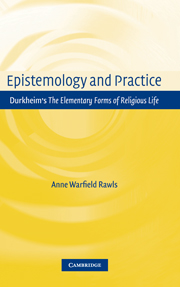Book contents
- Frontmatter
- Contents
- Acknowledgments
- Introduction
- 1 Durkheim's Outline of the Argument in the Introductory Chapter
- 2 Durkheim's Dualism: an Anti-Kantian, Anti-Rationalist Position
- 3 Sacred and Profane: the First Classification
- 4 Totemism and the Problem of Individualism
- 5 The Origin of Moral Force
- 6 The Primacy of Rites in the Origin of Causality
- 7 Imitative Rites and the Category of Causality
- 8 The Category of Causality
- 9 Logic, Language and Science
- 10 Durkheim's Conclusion Section iv: Logical Argument for Social Origin of the Categories
- Conclusion
- Bibliography
- Index
9 - Logic, Language and Science
Published online by Cambridge University Press: 22 September 2009
- Frontmatter
- Contents
- Acknowledgments
- Introduction
- 1 Durkheim's Outline of the Argument in the Introductory Chapter
- 2 Durkheim's Dualism: an Anti-Kantian, Anti-Rationalist Position
- 3 Sacred and Profane: the First Classification
- 4 Totemism and the Problem of Individualism
- 5 The Origin of Moral Force
- 6 The Primacy of Rites in the Origin of Causality
- 7 Imitative Rites and the Category of Causality
- 8 The Category of Causality
- 9 Logic, Language and Science
- 10 Durkheim's Conclusion Section iv: Logical Argument for Social Origin of the Categories
- Conclusion
- Bibliography
- Index
Summary
While the main body of The Elementary Forms is methodical in endless detail, the Conclusion is methodical in a very cryptic way. In the Conclusion, packed into a relatively short number of pages, Durkheim not only reviews the main arguments of the book; that rites are more essential than beliefs, and that participation in rites creates the categories of the understanding; he also makes new arguments about the relationship between religion and scientific argument, logic, and language, and then relates these new arguments to the epistemological argument laid out in the central chapters. This involves a closely argued series of points that are carefully organized into four numbered sections. It is only in the fourth of these sections that Durkheim discusses the categories of the understanding. That section will be discussed separately in the next chapter.
An analysis of various misreadings of The Elementary Forms suggests that scholars have tended to read Durkheim's Conclusion as if it loosely summarized the argument of the book as a whole. It does not. The discussions of logic and language, which are generally taken to be summary arguments, in fact, appear in the Conclusion for the first time, and are quite different from the discussions of epistemology and logic which appears in the body of the text. Taking the discussions of logic and language to represent a summary of his epistemological argument makes that argument appear to be hopelessly contradictory.
- Type
- Chapter
- Information
- Epistemology and PracticeDurkheim's The Elementary Forms of Religious Life, pp. 262 - 300Publisher: Cambridge University PressPrint publication year: 2005

